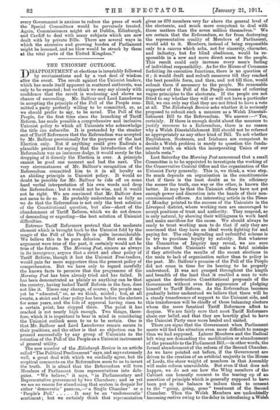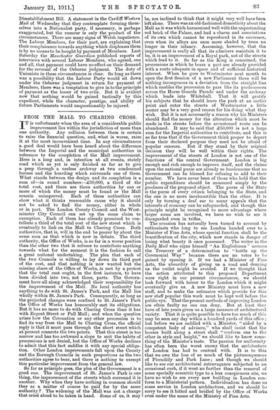THE UNIONIST OUTLOOK.
DISAPPOINTMENT at elections is invariably followed by recriminations and by a vast deal of wisdom after the event. The revolt against the Unionist leaders, which has made itself apparent in scattered outbursts, was only to be expected ; but we think we may say already with confidence that the revolt is weakening and shows no chance of succeeding. Mr. Balfour and Lord Lansdowne in accepting the principle of the Poll of the People com- mitted a party perfectly willing to be committed, or, as we should prefer to say, to be saved. The Poll of the People, for the first time since the launching of Tariff Reform, has made possible a comprehensive and inclusive Unionist policy to which all Unionists who acknowledge the title can subscribe. It is pretended by the straiter sect of Tariff Reformers that the Referendum was accepted by Mr. Balfour provisionally for the purposes of the last Election only. But if anything could give Radicals a plausible pretext for saying that the introduction of the Referendum was an insincere dodge, it would surely be the dropping of it directly the Election is over. A principle cannot be good one moment and bad the next. The very circumstances of Mr. Balfour's recognition of the Referendum committed him to it in all loyalty as an abiding principle in Unionist policy. It would no doubt be possible for Mr. Balfour to ride off on some hard verbal interpretation of his own words and drop the Referendum ; but it would not be wise, and it would not be right. We are convinced that Mr. Balfour does not mean to do so. He probably understands as fully as we do that the Referendum is not only the best solution of the Constitutional question, but also—short of the abandonment of Tariff Reform, which we do not dream of demanding or expecting—the best solution of Unionist difficulties.
Extreme Tariff Reformers pretend that the moderate element which is brought back to the Unionist fold by the magic of the Poll of the People is quite inconsiderable. We believe this to be pure delusion. But even if the argument were true of the past, it certainly would not be true of the future. The Morning Post, sincere as always in its insurgency, argues that a strict and clear policy of Tariff Reform, though it lost the Unionist Free-traders, would gain far more supporters than the present policy of comprehension. But we have only to regard carefully the known facts to perceive that the programme of the Morning Post has been already tried and has failed. It has been demonstrated as plainly as anything can be that the country, having looked Tariff Reform in the face, does not like it. Times may change, of course ; the people may yet be " educated," or, as we think, misled ; but, at all events, a strict and clear policy has been before the electors for some years, and the tide of approval having risen to a certain point, has stopped there. The point it has reached is not nearly high enough. Two things, there- fore, which it is important to bear in mind in considering the Unionist outlook seem to us to be certain. One is that Mr. Balfour and Lord Lansdowne remain secure in their positions, and the other is that no objection can be pressed successfully by any group of Unionists to the retention of the Poll of the People as a Unionist instrument of general utility. The new number of the .Edinburgh Review in an article called " The Political Predicament" says, and says extremely well, a great deal with which we cordially agree, but its sceptical comments on the Referendum seem to us to invert the truth. It is afraid that the Referendum will turn Members of Parliament from representatives into dele- gates. " We believe," it says, " in Parliamentary and Representative government by two Chambers ; and as yet we see no reason for abandoning that system in despair for either `democratic' panacea,—' a Single Chamber' or a People's Poll.' It may be an ' undemocratic' sentiment ; but we certainly think that representation gives us 670 members very far above the general level of the electorate, and much more competent to deal with those matters than the seven million themselves." We are certain that the Referendum, so far from destroying the representative quality of Members of Parliament, would add to it. Members, instead of being responsible only to a caucus which asks, not for sincerity, character, and industry, but for blind obedience, would be re- sponsible in a new and more direct sense to the people. This result could only increase every man's feeling of individual responsibility. As for the House of Commons forfeiting its executive functions, there is no question of it ; it would draft and redraft measures till they reached the best possible form, and then, and not till then, would submit them if necessary to the people. No reasonable supporter of the Poll of the People dreams of referring vague principles to the electorate. If the people are not fitted to say whether they will or will not have a particular Bill, we can only say that they are not fitted to have a vote at all. The Edinburgh Review asks whether it is seriously proposed to submit such a measure as a Welsh Disestab- lishment Bill to the Referendum. We answer :—" Yes, certainly. If there is enough doubt about the measure to justify recourse to a Referendum, there is no reason why a Welsh Disestablishment Bill should not be referred as appropriately as any other kind of Bill. To ask whether Englishmen, Scotsmen, and Irishmen are competent to decide a Welsh problem is surely to question the funda- mental truth on which the incorporating Union of our islands rests."
Last Saturday the Morning Post announced that a small Committee is to be appointed to investigate the working of the Conservative Central Office and the organisation of the Unionist Party generally. This is, we think, a wise step. So much depends on organisation in the constituencies that if there is the least doubt as to its efficiency the sooner the truth, one way or the other, is known the better. It may be that the Unionist offices have not put enough power and discretion into the hands of their non- commissioned officers. An interesting article in the Times of Monday pointed to the success of the Unionists in the Liverpool district, where working men are encouraged to accept positions of trust and authority. They respond, as is only natural, by showing their willingness to work hard and make sacrifices for the cause. We should always be ready to trust working men to do that if only they are convinced that they have an ideal worth fighting for and paying for. The only degrading and unfruitful scheme is to try to purchase loyalty by subsidy. But whatever the Committee of Inquiry may reveal, we are sure in advance that Unionists will make a fatal mistake if they attribute the results of the recent elections in the main to lack of organisation rather than to policy in the past. Mr. Balfour's promise of the Poll of the People did not come in time for its bearing to be properly understood. It was not grasped throughout the length and breadth of the land that it enabled a man to vote against the destructive Constitutional proposals of the Government without even the appearance of pledging himself to Tariff Reform. As the Referendum becomes gradually better understood we believe that there will be a steady transference of support to the Unionist side, and this transference will be chiefly of those balancing electors -whom the more fanatical Tariff Reformers affect to despise. We are fairly sure that most Tariff Reformers share our belief, and that they are heartily glad to have the Unionist Party once more healed and united.
There are signs that the Government when Parliament meets will find the situation even more difficult to manage than we had supposed. Labour Members and the Radical left wing are demanding the modification or abandonment of the preamble to the Parliament Bill,—in other words, the formal abandonment of the reform of the Second Chamber. As we have pointed out before, if the Government are driven to the creation of an artificial majority in the House of Lords, the sheer weight of numbers in that Assembly will make reform unavoidable. But even if that does not happen, we do not see how the Whig members of the Cabinet can honestly consent to the tearing up of an assertion of principle which is generally supposed to have been put in the balance to induce them to consent to the " going, going, gone" treatment of the Second Chamber. Then the Welsh Members are undoubtedly becoming restive owing to the delay in introducing a Welsh Disestablishment Bill. A statement in the Cardiff Western Mail of Wednesday that they contemplate forming them- selves into a Nationalist party, if necessary, is perhaps exaggerated, but the rumour is only the product of the circumstances. There are many signs of Welsh impatience. The Labour Members, for their part, are explaining that their complaisance towards anything which displeases them is by no means to be bought by payment of Members. Last Saturday the Manchester Guardian published reports of interviews with several Labour Members, who agreed, one and all, that payment could have no effect on their demand for the reversal of the Osborne judgment. The duty of Unionists in these circumstances is clear. So long as there was a possibility that the Labour Party would sit down under the Osborne judgment in return for payment of Members, there was a temptation to give in to the principle of payment as the lesser of two evils. But it is evident now that nothing would be gained tactically by this expedient, while the character, prestige, and ability of future Parliaments would unquestionably be injured.











































 Previous page
Previous page